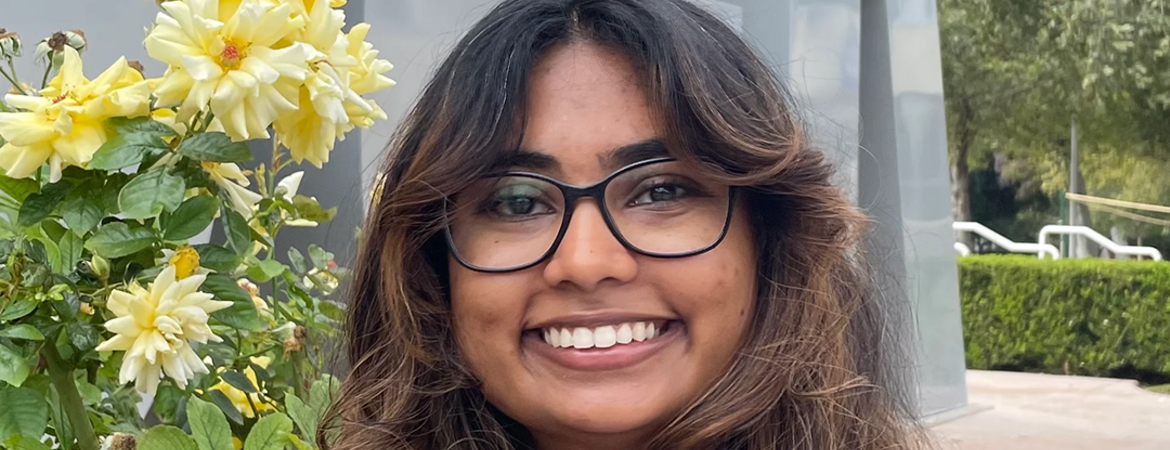
Born and raised in Riverside, CA, Sonali Bhakta, a 4th-year Biochemistry major, has always considered UCR to be (quite literally) the campus next door. In fact, she readily and proudly admits that she’s been “intertwined” with the college in some way, shape, or form since she was a fifth grade student at Riverside STEM Academy.
“I’ve lived my entire life within a one-mile radius of the UCR campus,” she says. “I used to attend ballet recitals here. I went to math camp, etymology camp…I even learned how to read at the extension center! The first 22 years of my life happened right next door to UCR, if not always on the campus directly. I toured other campuses and got into other schools, but nothing felt right - nothing clicked like UCR. It’s like my home.”
In fact, Sonali says the link between her hometown and the adjacent campus is inextricable, her connection to Riverside and UCR an organic association that continues to bring her full circle. She cites one of her UCR mentors, Physics Professor Bahram Mobasher as an example. “He was a lecturer at the Riverside STEM Academy when I was a fifth grader,” she explains. “I was 10 years old, and actually got his autograph on a NASA photograph of outer space!”
Fast forward 12 years, and Sonali says she took Professor Mobasher’s Physics 37 course at UCR last quarter. “I learned things about biology and chemistry that I didn’t learn from my core classes,” she says with a sense of dazed bemusement. “We ended up talking after every single lecture, and when I told him I was interested in pursuing a career that combines science and law, he became a huge supporter.”
Sonali says that Professor Mobasher encouraged her to apply to graduate school - she will pursue a Master of Science and Law at Northwestern University Pritzker School of Law starting in August. Although Sonali admits that her career trajectory isn’t the “straight line” most students pursue when they enter scientific fields of study, she says that Professor Mobasher and Dean Connie Nugent are mentors who have been foundational to her success at college.
“I met Dean Nugent before school even started because she was the one who interviewed me for the program,” Sonali says. “I was talking about issues I saw within the Riverside community with the schools, and how we can improve science programs. I can’t tell you how many times I’ve had conversations with her where one question ends up in an hour-long conversation about anything and everything, from giving me career advice to working with different professors.”
Sonali adds that Professor Mobasher and Dean Nugent were transformative in another way. “They pushed me to see the world and the education system from an adult perspective, rather than the student perspective,” she explains. “Previously, I was always the student attending the lecture, never the adult looking into the issues. They encouraged me to adopt that new role.”
In her third year at UCR, Sonali became a CNAS Science Ambassador because she wanted to make a difference and serve her community in a way that would benefit students from underserved communities. In addition, she’s played a pivotal role as President of Change in Scientific Importance for Youth (Delta SIFY) and coached the Science Olympiad Crime Busters, an event that tests students' knowledge and skills in forensic science and crime scene investigation at her alma mater, Riverside STEM Academy.
For Sonali, coaching Crime Busters to a first place finish in divisional competition this year is something she is quite proud of. “I competed in Crime Busters when I was in 8th grade,” she says. “It gives students a kind of whodunit scenario in which they have to do some experimentation to figure out what kind of powders and fingerprints were at a crime scene, glass analysis, etc. It’s looking at chemistry and legalities as part of the same thing. I was doing that at 14, and now at 22 I had the opportunity to coach the same exact event that I had participated in. Crazy!”
With regard to the Riverside/UCR axis, what goes around comes around is definitely more than just an idiom for Sonali. As she makes plans to attend Northwestern University this summer, Sonali is excited about her future path of pursuing a degree that combines science and law.
“People don’t understand that science is around us 24/7…from the materials your towels are made of to the hair products you use, it’s all scientifically based,” she explains. “What people don’t understand is that the FDA and government policies are creating the lines and definitions, a whole rulebook of what we can and cannot do with science. But the problem is that there aren’t a lot of people that are knowledgeable about science or scientific disciplines that are advocating for science in the legal field.”
Sonali aims to be a change agent on how science is communicated. “Another reason why I took up the law minor was to learn how to communicate based on my legal and scientific knowledge,” she says. “The common jibe is that scientists don’t know how to write, and that’s why people are debating the legitimacy of climate change, or that certain drugs aren’t really optimal for certain conditions…or, for example, do I need to vaccinate children if they are on the autism spectrum, and where do they fall on the spectrum with regard to vaccination.”
According to Sonali, science is meant to progress at all times. “The planet has given us so much,” she says. “What have we given back to the planet or, for that matter, humankind? We can progress all we want, but if we don’t save the planet, what’s the point?”
Sonali says she harbors a dream of someday making an impassioned plea before Congress about just these concerns. For a graduate whose whole academic life has been giving back, no doubt that’s something we can count on.